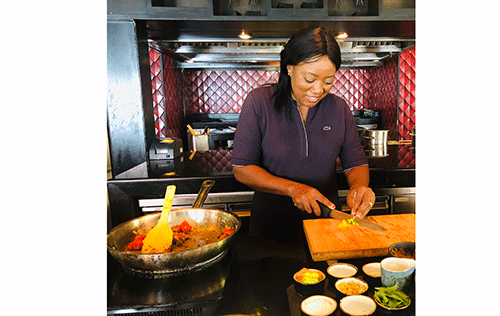Mary Hikumwah is a full-time crop and horticulture farmer in Okongo and a proud founder of Elegance Mission Investment CC, an agro-processing food company in Windhoek.
Hikumwah started her agri-business journey by growing crops, fruits and vegetables. However, she does not only end at harvesting, but goes further to add value.
Her interest in value-addition gained momentum after attending training by the Deutsche Gesellschaft fur Internationale Zusammenarbeit (GIZ) on value-addition, coupled with her intensive research on value-addition some two years ago.
“After attending the value-addition training by GIZ in 2020, I saw a gap of producing local organic food products. Therefore, when I am not processing my produce; I am offering training on value-addition to my community members,” she said.
Hikumwah grows peanuts, tomatoes, Kalahari wild melons, chili, oranges and so much more.
She makes homemade organic tropical fruit juice, honey made from dates, sugar made from dates, tomato sauce, mahangu biscuits with marula nuts, peanut butter, sweet chili and Kalahari wild melon jam.
She is also a small-scale poultry farmer, where she uses the eggs from chicken to make mayonnaise.
Hikumwah’s goal for her business is to have her products in local retail shops and export them to other parts of the African continent.
On the challenges faced, Hikumwah said a lack of support from the local community and buying packing materials are some of the difficulties she is experiencing.
“Farmers usually get to source food packaging materials from beyond our borders, and this results in farmers increasing their prices to make a reasonable profit from their products.
Hence, in most cases, people tend to ask why some Namibian products are expensive when they are locally produced. But if we as farmers could buy our packaging items locally, our prices would be lower,” she added.
Despite the challenges, Hikumwah also shared her best experiences in farming, citing employment-creation for the community and immense support from family and neighbours.
“Before I place any of my products in public, my family and neighbours get to taste, and give me valuable feedback. Their feedback gives me so much confidence to produce and process more. Added to that is having them buy my products as well,” she noted.
Hikumwah advised Namibian youth to change their perception towards farming as it creates sustainable income for farmers.
She also urged young farmers to work hard, and those willing to join should be ready to work hard as well.
– AgriBank



